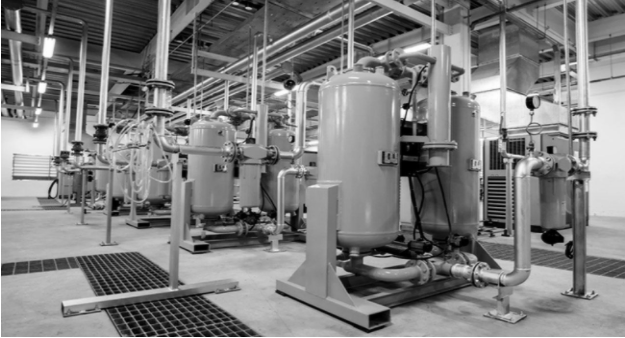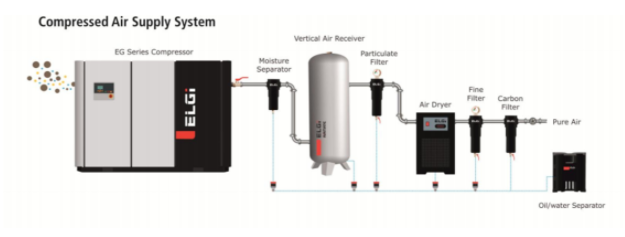September 18, 2020
Reliable, efficient and cost effective – compressed air is an integral part of the manufacturing process in a variety of industries. As a vital energy source, compressed air is regarded as a safe and clean utility, as compared to other energy sources.
In sensitive industries like pharma and food manufacturing; attention to detail is important. Even a small trace of contaminant can lead to wasted product, unnecessary downtime and business liability.
Maintaining the air quality of your compressed air system can help you save time and money. However, you should begin by understanding the specific needs of your air compressor.
Common air quality issues with compressed air systems
Moisture, lubricants and particulates can reduce the efficiency of your compressed air system. Contaminants can interfere with production making the compressed air system unusable, adulterate production in case of food manufacturing or pollute filter chambers in case of pharma and medical processes.
What causes disruptions in air quality supply?
Particulates:
Particulates are small pieces of solid material present in the air. Although particles of dust may seem insignificant, they can go unnoticed thus resulting in a huge impact on performance.
Particulate contamination depends on multiple conditions including location and nature of business. If your business is associated with cleaning and servicing of automobiles, the likelihood of contaminants is lesser, as compared to a woodworking business.
Moisture:
Air compressors produce hot air, resulting in relatively high levels of moisture. This moisture in the form of humidity can damage pipes reducing the life of the compressed air system.
Lubricants:
Some compressed air systems require lubrication to function effectively. However, failure to lubricate the system correctly, by applying either too much or too little, can damage your system. The use of low-quality lubricants can also be a serious concern for air compressors.
This is why some industries, like food or pharmaceutical require lubricant-free air compressors.
Air quality standards
Every country sets quality standards for their manufacturing processes and production. These standards help ensure that every part of the compressed air system meets the application norms.
Improving air quality specifically up to the required level or to meet the specific standards mentioned is important. If you filter and clean the air beyond the tolerable level of your end-point application, it will reduce the cost efficiency of your system.
The more equipment your process involves, the more the chances of malfunction. So, avoid investing in equipment which you do not really require.
Finding the level of filtration that suits for your specific air quality needs is key.
Methods to ensure air quality
Filters:
Filters are designed to remove particulates from the compressed air system. They also find application in removing excess lubricant especially in sensitive industries like pharma and food.
Aftercoolers:
An aftercooler cools the hot compressed air before it heads towards the end application. Once the air is cooled, the water is removed, leaving the compressed air close to the surrounding temperature. This cooler compressed air will therefore not cause any condensation to form in the pipes or any process degeneration
Dryers:
Dryers are also used to target the same issue of moisture in the compressed air system. However, rather than cooling the compressed air, dryers lower the dew point so that moisture build up is restricted or curtailed.
The BriscoeELGi service team can help you maintain and achieve the desirable air quality in your compressed air systems.
Reach out to us for more on - elgisales@rtbriscoe.com or www.rtbriscoe.com and follow us on our social media channels for tips and guidance to achieve maximum efficiency of your business processes.
Briscoe Elgi is the accredited dealer of Elgi Industrial Air Compressors in Nigeria.


